Featured
Platforms for Growth

Samir J Fancy, Chairman, Renaissance Services shares his insights on the $1.079bn sale of Topaz to DP World along with his future vision for Renaissance and why the deal is a winning proposition for all three companies. Mayank Singh reports
What are the reasons that prompted Renaissance Services to proceed with the sale of Topaz to DP World?
We went in for this deal keeping in mind what was important for Renaissance at the present juncture. We had a desire to de-leverage and become asset light. When we look at the global and regional markets, we see that there are very few positive triggers out there.
Our thinking was that if we are ticking enough boxes in terms of what we want for Renaissance, then this deal, perhaps with the only additional desire of a healthier valuation, ticked all the boxes that were important for the company.
Sometimes in business you need to take a long view, and given the circumstances in the world today, you can hope for a positive turn of events, but another negative shock in the industry might have been a bridge too far – and hope is a poor strategy. It was with that in mind that we chose to take this deal.
Overall, it was a mix of these two reasons, but more importantly it was about what was good for Renaissance.
As a thumb rule, a downturn is not considered a good time for an asset sale as valuations are depressed. Were there any external pressures that forced you to proceed with the transaction?
There was no external pressure or compulsion that forced us to proceed with the transaction at this moment. There are circumstances which we might have had to negotiate, if we had not gone ahead with the sale, but these were manageable but not easy.
For instance, liquidity was tough and we have been stating that very clearly, but we would have survived it. Compared to 2019, liquidity was tougher in 2017 and in the early part of 2018. There were triggers like the upcoming obligation towards Standard Chartered Private Equity/Affirma Capital (SCPEL), but SCPEL has been a fantastic partner throughout this journey with Topaz and have always been reasonable.
But the heavy issue was that in the past year we had tried many different avenues and could not see any near term liquidity solutions and we had a plan for Renaissance which could only go into top gear once we had shifted the overhang of Topaz. Once that was the prism then valuation became a relative issue.
Are there synergies between Topaz and DP World that assured you that this is a right fit for a company that you have nurtured and grown over the years?
For DP World one of their signature acquisitions a decade or so ago was the P&O brand. They already own Maritime assets. DP World owns a vast amount of real estate by way of their ports. Logistics is very important to their trade and Topaz is moving into logistics, particularly with their Chevron TCO deal, so that could have been attractive for DP World.
Topaz will also be taking them into the Caspian, where there are major possibilities for DP World to do other things that they are good at. This is a superb market and Topaz has a strong position in Azerbaijan and Kazakhstan, so there were those synergies and frankly speaking we have fantastic EBIDTA margins in Topaz and DP World would also benefit from those.
Can you share some details of the deal with our readers?
Talking about valuations, the value of the deal including minorities is $1.3bn. To make it crystal clear and totally transparent we have taken only the net number of $1.079bn and it has been flagged to the market.
We have agreed and signed off with DP World and now its down to the closing conditions which can take two to three months to get the various consents and fulfill other conditions. There will be regulatory, anti-monopoly consents which DP World will require to obtain in the normal course of a transaction of this size and scale.
We have called for a Shareholders Meeting for Renaissance on the July 29, 2019, where the deal will be presented for approval.
Will the proceeds from the sale reflect on Renaissance Services balance sheet this year or in 2020?
The proceeds of the sale will be reflected the minute we achieve financial closure. For example, even when we report our H1 results, which will be announced in the next few days, this will not be reflected as a business but a one line item flagging the gain or loss on the transaction.
Topaz was acquired by Renaissance Services in 2005 and you grew it multifold. Looking back how was your journey with Topaz?
The journey of Topaz was a really interesting one. When Renaissance acquired Topaz, it was a completely different company. It was in oil & gas fabrication, ship repair and owned a dozen or so old ships. We grew it into a global OSV fleet that in today’s environment would be the No.2 or No.3 OSV Company in the world. In 2014, out of the top 10 fleets globally, we would have been seven or eight in the world in terms of size. Unfortunately, most of those companies have filed for Chapter 11 or been restructured with their shareholders losing most and, in some cases, all their capital.
To put it in simple terms, this story is about a small Omani company that goes out into the market, builds a global fleet that competes with the very best in the world and that says a lot for Renaissance and it says a lot for Oman. Honestly, His Majesty has created an environment that allowed us the freedom to succeed and to compete with the very best in the world and most importantly win.
We have done this not just at the Topaz level, but also in Renaissance. We forayed into Afghanistan and Iraq et al where we were up against some of the largest global corporations and we competed and executed successfully. This says a lot about our structures, our governance, the outstanding management teams and people of Renaissance. What a journey – a wise man said it best “This is not the end, it is not even the beginning of the end, but it is, perhaps, the end of the beginning” so that is the journey and the spirit of enterprise within this company and its people and there is much more on the anvil.
You mentioned about various companies in this sector filing for Chapter 11 and wiping out shareholder value. What enabled Topaz to survive the downturn in the hydrocarbon sector since 2014?
We all like to say that we do great things because we are so smart, but the reality of life is that you need to be smart, patient, work hard and God has to be kind to you. It’s a mix of all those things but mostly God’s kindness that we were able to come through this phase. A big part of it was that we were in some unique geographical areas, which were not as exposed to global market trends as some of the other parts of the world.
Our joint venture in Azerbaijan and our contract in Kazakhstan gave us an edge. It is important to understand how our fleets get to those places – your ships travel through the Volga-Don Canal and depending upon the ship size, we need to cut the bridge, place it on the deck and then go through these canals, so it is not easy to do. As a consequence, if I had a ship chartered in the North Sea, it would need to immediately adjust to the prevailing global shipping rates.
Compared to this ships in Azerbaijan are chartered on long term rates, because getting the ship there is so tough that the client wants to procure a contract for three, five and at times seven years. Having a particular skill and being in a niche area are factors that gave us a unique edge in the market.
Market analysts felt that Renaissance has been a highly leveraged company. Will this transaction enable you to de-leverage the company substantially?
Absolutely, Topaz is a great business but it is an asset heavy model. Most of our leverage came at the Topaz level, as it was a big play. For a local Omani company it’s a monster play and so now our gearing will come down to 1.3 post this transaction.
What are the objectives that this transaction fulfills for Renaissance?
The objective is to make Renaissance a pure play on services, build an asset light model, let it become a dividend paying company with the aim of providing superior returns to its shareholders and to take away the cyclicality that we had till now.
How are the proceeds from the sale going to be utilised?
We will keep some cash on the balance sheet but most of it will go towards paying off debt.
Once the debts are paid off and your gearing comes down, the company will save and generate additional cash. How are you going to utilise the surplus cash that is expected to be generated year-on-year?
As I mentioned earlier, the goal is to start rewarding our shareholders and to provide superior performance. This will happen in two ways, one is through the growth in the value of the company. Secondly, the pure play in the services sector will allow for expanded multiples and reward shareholders with as much cash as we can.
You mentioned about services being a big play for the company. What is your vision for Renaissance Services from here on?
The beauty of our services model is that many assets are already in place on the ground. As IFM service providers we step in and take over all the non core services that large corporates or government entities require so they can focus on their core business. So if you go to Almouj, BP Khazzan or so many other facilities around Oman it is Renaissance and its people executing the services.. Increasingly, this is becoming part of institutional efficiency and we are going to grow it, and move across all the sectors in Oman and beyond. This is the service element which is the basis of our revenue model.
To be able to provide our services beyond pure contract services many government and quasi government agencies need to outsource complete residential packages for their work force e.g. PDO where Renaissance built 5 PAC (permanent accommodation for contractors) and then the massive Duqm development. We have branded these as Renaissance Villages with 20 years of experience. Today, if someone wants to build a facility for a company and they go to a bank for loans, the bank runs an execution, development and post execution risk. What’s great about Renaissance is the fact that we provide an entire package and have done so successfully repeatedly. So we are almost in a plug and play mode, we develop, people can move in there, live there, be fed, get housekeeping, recreation, healthcare and every other form of life support. When the entire service isunder one roof, it is an unbeatable proposition in terms of competitiveness.
We also work as an enabler for growth in areas like Duqm. Once the government made a decision and formed SEZAD, we rallied behind them, put up a facility without assured occupancy, as we believed in their vision and spent $200mn on Renaissance Village Duqm (RVD). It took time and we had our share of heartaches, when things got delayed with the refinery etc., but today, we see a very clear path to full occupancy over the course of this year. The point is how many private company’s in Oman can build something like a RVD and provide an end to end service.
The reality is that today Oman’s capital markets have advanced, there are Sukuks, debt like instruments, real estate investment opportunities, fixed income etc. Through Topaz we demonstrated that we could tap the London and New York markets issuing Reg 144 bonds. So we are seeing that there are less limitations on our growth and we will no longer be reliant on our balance sheet only. Overall, we want to have sticky long term revenue attached to us for 20 to 40 years. There is student housing, white collar facilities, military requirements – the list is endless and our appetite to deliver the service is voracious.
We have won a waste management contract and we are going to increase our presence in that space. We have rolled out a programme for home care maintenance and it has taken off well and will go national. There are related things on the environment and clean energy side, which fit well into our suite of services. For example, in Fahud we built an entire car park with solar panels for our PDO project there on our own account. We did it as a good corporate citizen who believes in clean energy and wants to lead the way in contributing
to the communities we serve.
Renaissance has risked going into asset heavy businesses in the past. But going forward, you would prefer to be in asset light businesses. Does this mark a major rethink on your business model and has this been triggered by your experience with Topaz?
All this is relative. Risk is a part of entrepreneurship. If you do not buy a ticket to a ballgame you will never be part of the experience. That’s important. Secondly, how can one be chastened if one has built a company which is amongst the top three in the world. On the other hand, every entrepreneur realizes that he or she is not going to win at everything. When I talk about being asset light, I look at it on a very large scale. Not many people would look at a company which has the Duqm Village or all the PDO PACs on its balance sheet as asset light. We are talking of being asset light relative to the growth ahead and consistent with the Western peer group to which we aspire. The point will always be to expand in areas whose time has come and at this time IFM pure play is the place and space in which we will excel and grow. The fact that it happens to be relatively asset light is not the main driver.
WATCH THE COMPLETE VIDEO INTERVIEW:
-
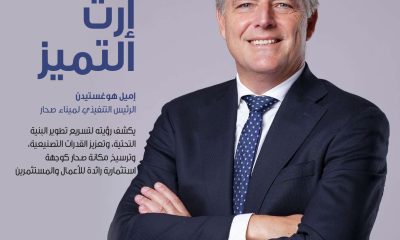
 Alamaliktistaad Magazines2 months ago
Alamaliktistaad Magazines2 months agoAlam Al Iktisaad – September 2025 Edition
-
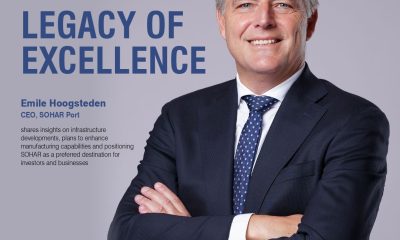
 Magazines2 months ago
Magazines2 months agoOER – September 2025 Issue
-
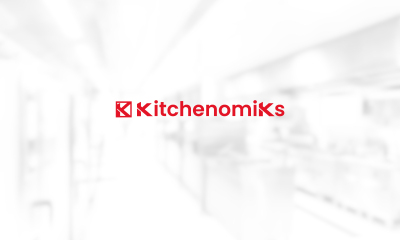
 News2 months ago
News2 months agoKitchenomiKs Secures Investment of US$3.2M Led by Jasoor Ventures
-

 News2 months ago
News2 months agoOman Inaugurates ‘Hadatha’ – Its All-New Cybersecurity Center
-
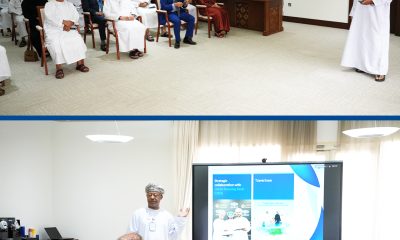
 Banking & Finance2 months ago
Banking & Finance2 months agoOman Arab Bank Highlights Its Ongoing Strategic Initiatives and Future Plans
-

 News2 months ago
News2 months agoIEA Expects Global Oil Market to Remain Oversupplied in 2026
-
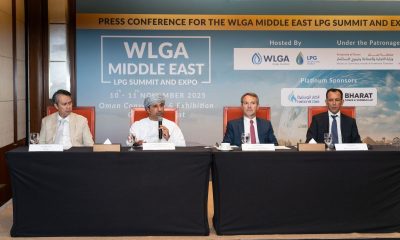
 Energy2 months ago
Energy2 months agoWLGA Middle East LPG Summit & Expo 2025 to be held at OCEC on November 10 and 11
-
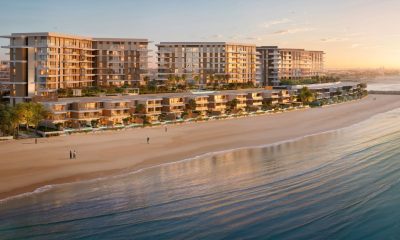
 Real Estate2 months ago
Real Estate2 months agoAl Mouj Muscat Unveils Azura Beach Residences Phase 2: A New Chapter in Waterfront Living































You must be logged in to post a comment Login